- Home
- Tony Hillerman
A Thief of Time Page 16
A Thief of Time Read online
Page 16
“Right.”
That done, he sat a moment, thinking. He would go to Bluff and take a look at the barn where Harrison Houk had done the remarkable—written him a note while waiting for his killer. He wanted to see that place. The action jarred on him. Why would Houk care that much about a woman who was merely a customer? “Shes still alive up,” the note had said. Up? Up to today? Up what? Up where? Up Watersprinkler Canyon? She had taken her sleeping bag. The boy had seen her loading a saddle. But back to Houk. Starting the note. At that point, almost certainly, Houk had been interrupted by the killer. Had run out of time. Had presumed the killer would destroy the note. Would not want the police to know that “she” was alive. So was “she” Eleanor hyphenated? Who else would care about the note? And yet Leaphorn had trouble putting into the picture the woman who marinated the beef and prepared the dinner so lovingly. He could not see her in that barn, firing her little pistol into the skull of an old man lying facedown in the hay. He shook his head. But that was sentiment, not logic.
Major Nez stood in his door, watching him. “Interesting case,” Nez said.
“Yeah. Hard one to figure.” Leaphorn motioned him in.
Nez simply leaned against the wall, holding a folded paper in his hand. He was getting fat, Leaphorn noticed. Nez had always been built like a barrel, but now his stomach sagged over his broad uniform belt.
“Doesn’t sound like something you can get sorted out in less than a week,” Nez said. He tapped the paper against the back of his hand, and it occurred to Leaphorn that it was his letter of resignation.
“Probably not,” Leaphorn said.
Nez held out the letter. “You want this back? For now? You can always send it in again.”
“I’m tired, Ron. Have been a long time, I guess. Just didn’t know it.”
“Tired of living,” Nez said, nodding. “I get that way now and then. But it’s hard to quit.”
“Anyway, thanks,” Leaphorn said. “You know where McGee went?”
Leaphorn found Detective McGee eating a late breakfast at the Navajo Nation Inn and told him everything he knew about Eleanor Friedman-Bernal that seemed remotely pertinent. Then he drove back to his house, dug his pistol belt out of the bottom drawer of his dresser, took out the weapon, and dropped it into his jacket pocket. That done, he drove out of Window Rock, heading north.
FIFTEEN
THE YOUNG WOMAN to whom Chee’s call was referred at the Madison Police Department had a little trouble believing in the Navajo Tribal Police. But after that was settled, things became most efficient. Yes, handguns were licensed. No, it would be easy to check the record. Just a moment. It was not much more than that.
The next voice was male. Eleanor Friedman-Bernal? Yes, she had been issued a license for a handgun. She had registered a .25 caliber automatic pistol.
Chee noted the details. The pistol was a brand he’d never heard of. Neither had the clerk in Madison. “Portuguese, I think,” he said. “Or maybe it’s Turkish, or Brazilian.”
Step two went almost as quickly. He called the San Juan County Sheriff’s Office and asked for Undersheriff Robert Bates, who usually handled homicides. Bates was married to a Navajo, who happened to be “born to” the Kin yaa aanii—the Towering House People—which was linked in some way Chee had never understood to his grandfather’s To’ aheedlinii’—the Waters Flow Together Clan. That made Chee and Bates vaguely relatives. Just as important, they had worked together a time or two and liked each other. Bates was in.
“If you have the lab report back, I need to know about the bullets that killed Etcitty and Nails,” Chee said.
“Why?” Bates asked. “I thought the FBI decided that killing wasn’t on reservation land.”
“Out on the Checkerboard, the FBI always decides that,” Chee said. “We’re just interested.”
“Why?”
“Ah, hell, Robert,” Chee said. “I don’t know why. Joe Leaphorn is interested, and Largo has me working with him.”
“What’s going on with Leaphorn? We heard he had a nervous breakdown. Heard he quit.”
“He did,” Chee said. “But not yet.”
“Well, it was a twenty-five-caliber pistol, automatic judging from the ejection marks on the empties. All the same weapon.”
“You have a missing person’s report on a woman who owns a twenty-five-caliber automatic pistol,” Chee said. “Her name’s Dr. Eleanor Friedman-Bernal. She worked out of Chaco Canyon. Anthropologist. Where Etcitty worked.” He told Bates more of what he knew about the woman.
“I got her file right here on my desk,” Bates said. “I just a minute ago got a call from a Utah State Policeman. They want us to do some checking up on her out at Chaco. Seems they had a fellow shot up at Bluff and he left a note to Leaphorn telling him this woman is still alive. You know about that?”
“Heard about the killing. Not about any note.” He was thinking that a few years ago this weird roundabout communication would have surprised him. Now he expected it. He was remembering Leaphorn chewing him out for not passing along all the details. Well, there was no reason for Leaphorn not to have told him about this. Except that Leaphorn considered him merely an errand boy. Chee was offended.
“Tell me about it,” he told Bates. “And don’t leave anything out.”
Bates told him what he’d been told. It didn’t take long.
“So Utah State Police think Dr. Friedman showed up and offed Houk,” Chee concluded. “Any theories about motive?”
“Big pot hunting conspiracy is what they seem to think. They’ve had a federal crackdown up there on pot thieves last year. Bunch of arrests. Grand jury sitting in Salt Lake handing down indictments. So they’re thinking pots,” Bates said. “And why not? Big money in it the way prices are now. Hell, when we was kids and used to go out and dig ’em up around here, you were lucky to get five bucks. Listen,” he added, “how you coming on being a medicine man?”
“No clients.” It was not a subject Chee wanted to discuss. It was November, already into the “Season When Thunder Sleeps,” the season for curing ceremonials, and he hadn’t had a single contact. “You going to Chaco now?”
“Soon as I get off the telephone.”
Chee gave him a quick rundown on the people he should talk to: Maxie Davis, the Lunas, Randall Elliot.
“They’re worried about the woman. Friends of hers. Be sure and tell them about the note.”
“Why, sure,” Bates said. He sounded slightly offended that Chee had even mentioned it.
There was nothing to do then but stick close to the telephone and wait for Leaphorn’s call from Bluff. He dug into his paperwork. A little before noon, the phone rang. Leaphorn, Chee thought.
It was Janet Pete. Her voice sounded odd. Was Chee doing anything for lunch?
“Nothing,” Chee said. “You calling from Shiprock?”
“I drove up. Really just went for a drive. Ended up here.” She sounded thoroughly down.
“Lunch then,” he said. “Can you meet me at the Thunderbird Café?”
She could. And did.
They took a booth by the window. And talked about the weather. A gusty wind was rattling the pane and chasing dust and leaves and now a section of the Navajo Times down the highway outside.
“End of autumn, I guess,” Chee said. “You watch Channel Seven. Howard Morgan says we’re going to get the first blast of winter.”
“I hate winter,” Janet Pete said. She hugged herself and shivered. “Dismal winter.”
“The counselor has the blues,” Chee said. “Anything I can do to cheer you up? I’ll call Morgan and see if he can postpone it.”
“Or call it off altogether.”
“Right.”
“Or there’s Italy.”
“Which is warm, I hear,” Chee said, and then he saw she was serious.
“You hear from your Successful Attorney?”
“He flew all the way to Chicago, to Albuquerque, to Gallup. I met him at Gallup.”
&nb
sp; Not knowing what to say, Chee said: “Not exactly meeting him halfway.” It sounded flippant. Chee didn’t feel flippant. He cleared his throat. “Has he changed? Time does that with people. So I’m told.”
“Yes,” Janet Pete said. But she shook her head. “But no. Not really. My mother told me a long time ago: ‘Don’t ever expect a man to change. What you see is what you live with.’”
“I guess so,” Chee said. She looked tired, and full of sadness. He reached out and took her hand in his. It was cold. “Trouble is, I guess you love him anyway.”
“I don’t know,” Janet Pete said. “I just…” But the sympathy was too much for her. Her voice choked. She looked down, fumbling in her purse.
Chee handed her his napkin. She held it to her face.
“Rough life,” Chee said. “Love is supposed to make us happy, and sometimes it makes us miserable.”
Through the napkin he heard Janet sniff.
He patted her hand. “This sounds like a cliché, or whatever it is, but I know how you feel. I really do.”
“I know,” Janet said.
“But you know, I’ve decided. I’m giving up. You can’t go on forever.” As he heard himself saying that, he was amazed. When did he decide that? He hadn’t realized it. He felt a surge of relief. And of loss. Why can’t men cry? he wondered. Why is that not allowed?
“He wants me to go to Italy with him. He’s going to Rome. Taking over their legal affairs for Europe. And Africa. And the Middle East.”
“He speak Italian?” As he said it, it seemed an incredibly stupid question. Totally beside the point here.
“French,” she said. “And some Italian. And he’s perfecting it. A tutor.”
“How about you?” he said. Why couldn’t he think of something less inane. He would be asking her next about her passport. And packing. And airfares. That wasn’t what she wanted to talk about. She wanted to talk about love.
“No,” she said.
“What did he say? Does he understand now that you want to be a lawyer? That you want to practice it?”
The napkin was in her lap now. Her eyes dry. But they showed she’d been crying. And her face was strained.
“He said I could practice in Italy. Not with his company. It has a nepotism rule. But he could line something up for me after I got the required Italian license.”
“He could line something up. For you.”
She sighed. “Yeah. That’s the way he put it.
And I guess he could. At a certain level in law, the big firms feed on one another. There would be Italian firms doing feed-out work. The word would go into the good-old-boy network. Tit for tat. I guess once I learned Italian I would be offered a job.”
Chee nodded. “I’d think so,” he said.
Lunch came. Mutton stew and fry bread for Chee. Janet was having a bowl of soup.
They sat looking at the food.
“You should eat something,” said Chee, who had totally lost his appetite. He took a spoonful of the stew, a bite of fry bread. “Eat,” he ordered.
Janet Pete took a spoonful of soup.
“Made a decision yet?”
She shook her head. “I don’t know.”
“You know yourself better than anyone,” he said. “What’s going to make you happy?”
She shook her head again. “I think I’m happy when I’m with him. Like dinner last night. But I don’t know.”
Chee was thinking about the dinner and how it had ended, and what happened then. Had she gone to his room with him? Had she spent the night there? Probably. The thought hurt. It hurt a lot. That surprised him.
“I shouldn’t let things like this drag on,” she said. “I should decide.”
“We let ours drag on. Mary and I. And I guess she decided.”
He had released her hand when lunch arrived. Now she reached over and put hers on his. “I have your napkin,” she said. “Slightly damp but still”—she looked at it, a rumpled square of pale blue paper—“usable in case of emergency.”
He realized instantly that this was her bid to change the subject. He took the napkin, dropped it in his lap.
“Have you realized how lucky you are to have been brought to the only café in Shiprock with napkins?”
“Noted and appreciated,” she said. Her smile seemed almost natural. “And how are things going with you?”
“I told you about the Backhoe Bandit. And Etcitty?”
She nodded. “That must have been gruesome. How about finding the woman?”
“How much did I tell you about that?”
She reminded him.
He told her about Houk, about the note left for Leaphorn, about Eleanor Friedman-Bernal’s pistol and how it was the same caliber used in the killings, about Leaphorn’s obsessive interest in finding the Utah site to which Friedman’s long-lost potter seemed to have moved.
“You know you have to file for a permit to dig sites like that on the reservation. We have an office in Window Rock that deals with it,” Janet Pete said. “Did you check that?”
“Leaphorn might have,” Chee said. “But apparently she was trying to find out where the stuff was coming from. You’d have to know that before you could file.”
“I guess so. But I think they’re all numbered. Maybe she would just guess at it.”
Chee grinned and shook his head. “Back when I was an anthropology student, I remember Professor Campbell, or somebody, telling us there were forty thousand sites listed with New Mexico Laboratory of Anthropology numbers. That’s in New Mexico alone. And another hundred thousand or so on other registries.”
“I didn’t mean just pick a number at random,” she said, slightly irked. “She could describe the general location.”
Chee was suddenly interested. “Maybe Leaphorn already looked into it,” he said. He was remembering that probably he would be hearing from Leaphorn soon. He’d left word with the switchboard to relay the call here. “But would it take long to check?”
“I could call,” she said, looking thoughtful. “I know the man who runs it. Helped him with the regulations. I think, to dig on the reservation, I think you have to apply to the Park Service and the Navajo Cultural Preservation Office both. I think you have to name a repository for whatever you recover, and get the archive system approved. And maybe…”
Chee was thinking how great it would be if, when Leaphorn called, he could tell him the map coordinates of the site he was looking for. His face must have showed his impatience. Janet stopped midsentence. “What?” she said.
“Let’s go back to the station and call,” he said.
The call from Leaphorn was waiting when they walked in. Chee gave him what he’d learned from the Madison police and from Bates at the San Juan County Sheriff’s Office. “They’re expecting a report from the Utah State Police,” Chee added. “Bates said he would call when he gets it.”
“I’ve got it,” Leaphorn said. “It was twenty-five-caliber, too.”
“Do you know if Friedman applied for a permit to dig that site you’re looking for?”
Long silence. “I should have thought of that,” Leaphorn said finally. “I doubt if she did. The red tape takes years and it’s a double filing. Park Service clearance plus tribal clearance, and all sorts of checking and screwing around gets involved. But I should have checked it.”
“I’ll take care of it,” Chee said.
The man to call, Janet Pete said, was T. J. Pedwell. Chee reached him just back from lunch. Had he had any applications from Dr. Eleanor Friedman-Bernal to dig on a reserved Anasazi site on the reservation?
“Sure,” Pedwell said. “Two or three. On Checkerboard land around Chaco Canyon. She’s that ceramics specialist working over there.”
“How about over on the north side of the reservation? Up in Utah.”
“I don’t think so,” Pedwell said. “I could check on it. Wouldn’t know the site number, would you?”
“’Fraid not,” Chee said. “But it might be somewhere near the n
orth end of Many Ruins Canyon.”
“I know that place,” Pedwell said. “Helped with the Antiquities survey all up through that part of the country.”
“You know the canyon the local people call Watersprinkler?”
“It’s really Many Ruins,” Pedwell said. “It’s full of pictographs and petroglyphs of Kokopelli. That’s the one the Navajos call the Watersprinkler yei.”
“I have a description of the site, and it sounds unusual,” Chee said. He told Pedwell what Amos Whistler had told him.
“Yeah,” Pedwell said. “Sounds familiar. Let me check my files. I have photos of most of them.”
Chee heard the telephone click against something. He waited and waited. Sighed. Leaned a hip against the desk.
“Trouble?” Janet Pete asked.
Pedwell’s voice was in his ear before he could respond.
“Found it,” Pedwell said. “It’s N.R. 723. Anasazi. Circa 1280–1310. And there’s two other sites right there with it. Probably connected.”
“Great!” Chee said. “How do you get there?”
“Well, it ain’t going to be easy. I remember that. We packed into some of them on horse back. Others we floated down the San Juan and walked up the canyon. This one I think we floated. Let’s see. Notes say it’s five point seven miles up from the mouth of the canyon.”
“Dr. Friedman. She apply to dig that one?”
“Not her,” Pedwell said. “Another of those people out at Chaco did. Dr. Randall Elliot. They working together?”
“I don’t think so,” Chee said. “Does the application say he was collecting St. John’s Polychrome pots?”
“Lemme look.” Papers rustled. “Doesn’t sound like pots. Says he is studying Anasazi migrations.” Mumbling sounds of Pedwell reading to himself. “Says his interest is tracing genetic patterns.” More mumbling. “Studying bones. Skull thickness. Six-fingeredness. Aberrant jaw formation.” More mumbling. “I don’t think it has anything to do with ceramics,” Pedwell said, finally. “He’s looking at the skeletons. Or will be if your famous Navajo bureaucracy, of which I am a part, ever gets this processed. Six-fingeredness. Lot of that among the Anasazi, but hard to study, because hands don’t survive intact after a thousand years. But it sounds like he’s found some family patterns. Too many fingers. An extra tooth in the right side of the lower jaw. A second hole where those nerves and blood vessels go through the back of the jaw, and something or other about the fibula. Physical anthropology isn’t my area.”

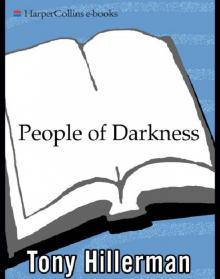 People of Darkness
People of Darkness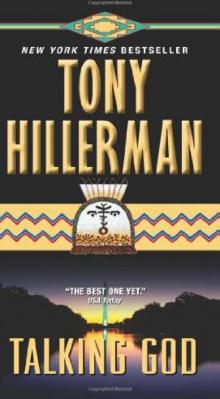 Talking God jlajc-9
Talking God jlajc-9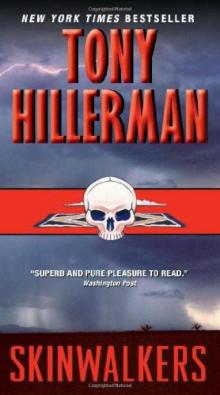 Skinwalkers jlajc-7
Skinwalkers jlajc-7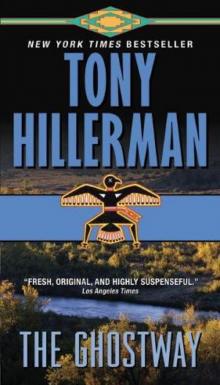 The Ghostway jlajc-6
The Ghostway jlajc-6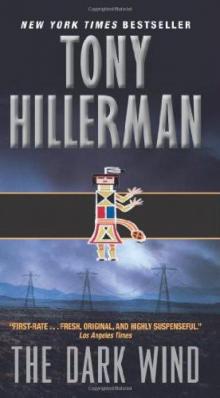 The Dark Wind jlajc-5
The Dark Wind jlajc-5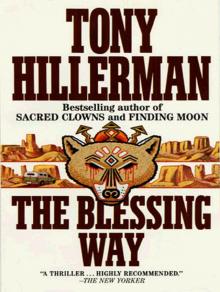 The Blessing Way
The Blessing Way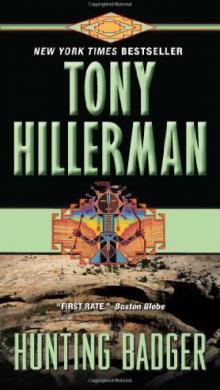 Hunting Badger jlajc-14
Hunting Badger jlajc-14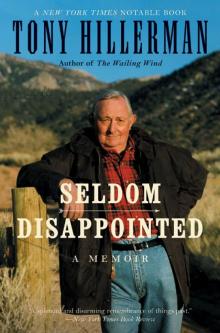 Seldom Disappointed: A Memoir
Seldom Disappointed: A Memoir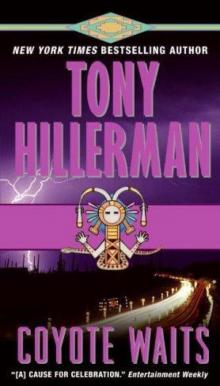 Coyote Waits jlajc-10
Coyote Waits jlajc-10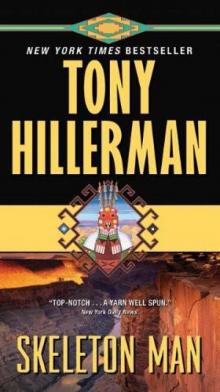 Skeleton Man jlajc-17
Skeleton Man jlajc-17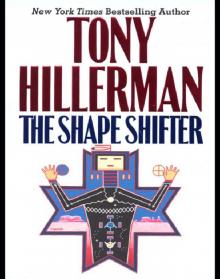 The Shape Shifter
The Shape Shifter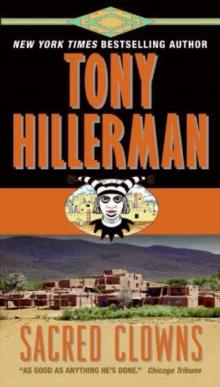 Sacred Clowns jlajc-11
Sacred Clowns jlajc-11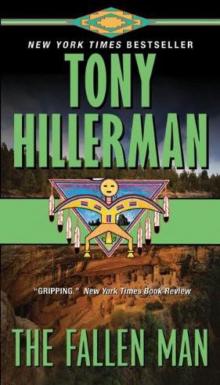 The Fallen Man jlajc-12
The Fallen Man jlajc-12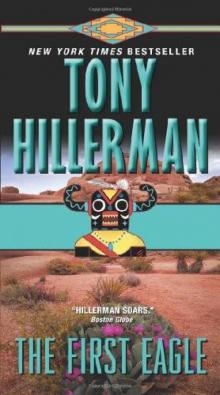 The First Eagle jlajc-13
The First Eagle jlajc-13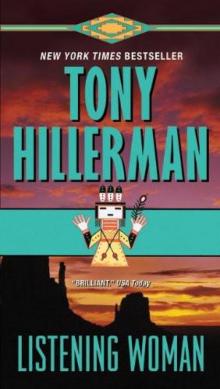 Listening Woman jlajc-3
Listening Woman jlajc-3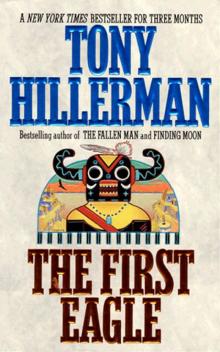 The First Eagle
The First Eagle Skeleton Man
Skeleton Man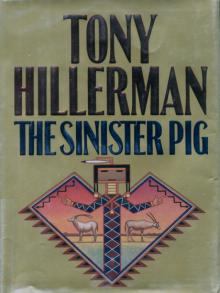 The Sinister Pig jlajc-16
The Sinister Pig jlajc-16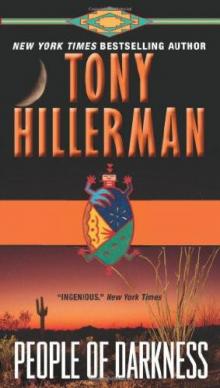 People of Darkness jlajc-4
People of Darkness jlajc-4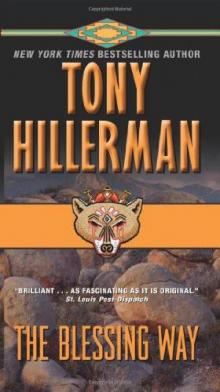 The Blessing Way jlajc-1
The Blessing Way jlajc-1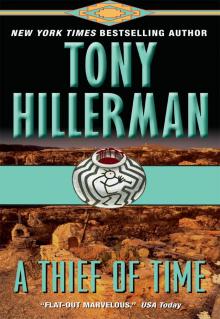 A Thief of Time
A Thief of Time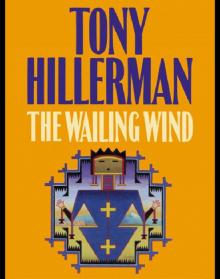 The Wailing Wind
The Wailing Wind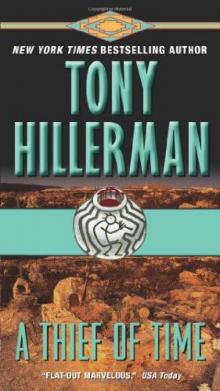 A Thief of Time jlajc-8
A Thief of Time jlajc-8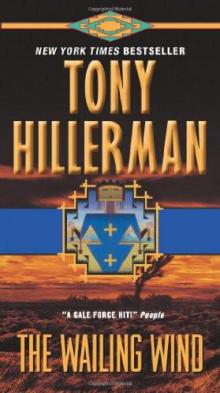 The Wailing Wind jlajc-15
The Wailing Wind jlajc-15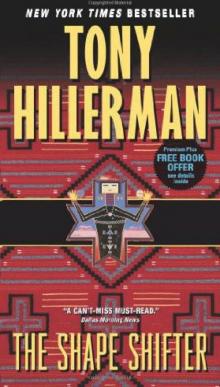 The Shape Shifter jlajc-18
The Shape Shifter jlajc-18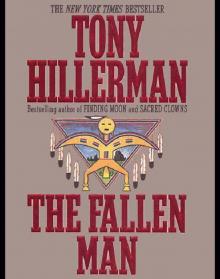 The Fallen Man
The Fallen Man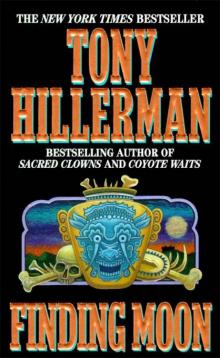 Finding Moon
Finding Moon